This is a list of the most notable films produced in the Cinema of Germany in 1941.
This is a list of the most notable films produced in the Cinema of Germany in 1941.
| Title | Director | Cast | Genre | Notes |
|---|---|---|---|---|
| Auf Ostkurs | documentary | |||
| Bauten im neuen Deutschland | C.A. Engel | documentary | ||
| Bunte Kriechtierwelt | Wolfram Junghans | The Colorful World of Animals that Crawl; nature documentary; in Agfacolor | ||
| Die Englische Krankheit | Kurt Stefan | documentary | The Sickness of Being English; anti-British propaganda film | |
| Fliegende Früchte - Wie die Natur pflanzt und sät | Kurt Stefan | documentary | ||
| Himmelstürmer. Geburt und Geschichte des Fliegens | Walter Jerven | |||
| Ins Grab kann man nichts mitnehmen | Wolfgang Staudte | documentary | ||
| Ins Grab kann man nichts mitnehmen | Wolfgang Staudte | documentary | ||
| Leuchtendes Hellas | Hans Bröcker | documentary | ||
| Mooswunder | Ulrich K.T. Schultz | Documentary | ||
| Der Neusiedler See | Ulrich K.T. Schultz | documentary | ||
| Sieg im Westen | Svend Noldan | Victory in the West; documentary/propaganda film about Blitzkrieg in Western Europe | ||
| Sonnige Saar | Curt A. Engel | documentary | ||
| The Soviet Paradise | Sowjetparadies, 14-minute anti-Soviet documentary propaganda film | |||
| Thüringen, das grüne Herz Deutschlands | J.C. Hartmann | documentary | ||
| Vom Werden der Kristalle | Ulrich K.T. Schultz | Documentary | ||
| Wisente | Ulrich K.T. Schultz | Documentary | ||
| Zeitgemäße Pflanzenzucht | Ulrich K.T. Schultz | Documentary |
| Title | Director | Cast | Genre | Notes |
|---|---|---|---|---|
| 5-Pfennig-Serenade | Hans Fischerkoesen | animation | ||
| Frühling in Japan | Arnold Fanck (unconfirmed) | Short | ||
| Japans heiliger Vulkan | Arnold Fanck (unconfirmed) | Short | ||
| Kampf um den Berg - Eine Hochtour vor 20 Jahren | Arnold Fanck | Short | ||
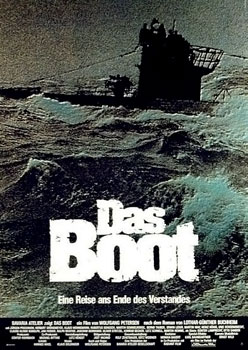
Das Boot is a 1981 West German war film written and directed by Wolfgang Petersen, produced by Günter Rohrbach, and starring Jürgen Prochnow, Herbert Grönemeyer and Klaus Wennemann. It has been exhibited both as a theatrical release (1981) and a TV miniseries (1985). Also, several different home video versions, as well as a director's cut (1997) supervised by Petersen, have been released.

The Wannsee Conference was a meeting of senior government officials of Nazi Germany and Schutzstaffel (SS) leaders, held in the Berlin suburb of Wannsee on 20 January 1942. The purpose of the conference, called by the director of the Reich Security Main Office SS-Obergruppenführer Reinhard Heydrich, was to ensure the co-operation of administrative leaders of various government departments in the implementation of the Final Solution to the Jewish Question, whereby most of the Jews of German-occupied Europe would be deported to occupied Poland and murdered. Conference participants included representatives from several government ministries, including state secretaries from the Foreign Office, the justice, interior, and state ministries, and representatives from the SS. In the course of the meeting, Heydrich outlined how European Jews would be rounded up and sent to extermination camps in the General Government, where they would be killed.

The 1940s was a decade that began on January 1, 1940, and ended on December 31, 1949.

Sergeant York is a 1941 American biographical film about the life of Alvin C. York, one of the most decorated American soldiers of World War I. Directed by Howard Hawks and starring Gary Cooper in the title role, the film was a critical and commercial success, and became the highest-grossing film of 1941. In 2008, Sergeant York was selected for preservation in the United States National Film Registry by the Library of Congress as being "culturally, historically, or aesthetically significant".
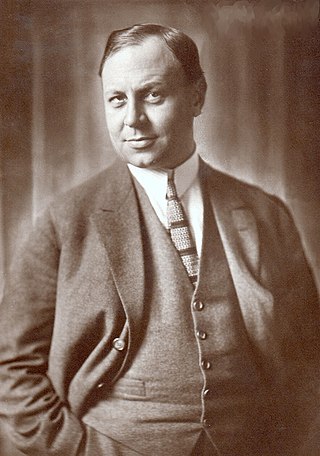
Emil Jannings was a Swiss-born German actor who was popular in Hollywood in the 1920s. He was the first recipient of the Academy Award for Best Actor for his roles in The Last Command and The Way of All Flesh. As of 2024, Jannings is the only German ever to have won the category.
Robert Florey was a French-American director, screenwriter, film journalist and actor.
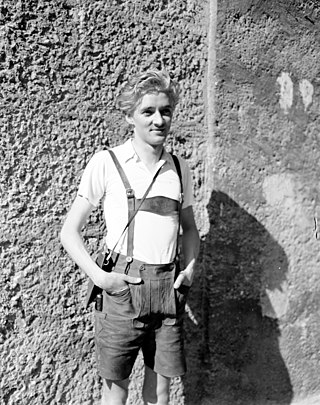
Oskar Werner was an Austrian stage and cinema actor whose prominent roles include two 1965 films, The Spy Who Came In from the Cold and Ship of Fools. Other notable films include Decision Before Dawn (1951), Jules and Jim (1962), Fahrenheit 451 (1966), The Shoes of the Fisherman (1968) and Voyage of the Damned (1976).
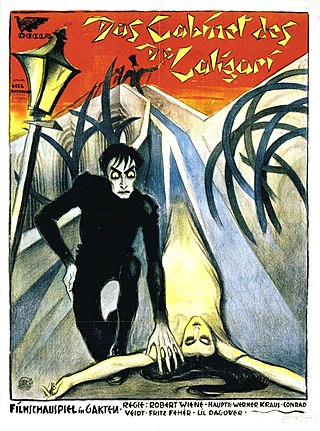
The Cabinet of Dr. Caligari is a 1920 German silent horror film directed by Robert Wiene and written by Hans Janowitz and Carl Mayer. Considered the quintessential work of German Expressionist cinema, it tells the story of an insane hypnotist who uses a brainwashed somnambulist to commit murders. The film features a dark, twisted visual style, with sharp-pointed forms, oblique, curving lines, structures and landscapes that lean and twist in unusual angles, and shadows and streaks of light painted directly onto the sets.

The Independent State of Croatia was a World War II-era puppet state of Nazi Germany and Fascist Italy. It was established in parts of occupied Yugoslavia on 10 April 1941, after the invasion by the Axis powers. Its territory consisted of most of modern-day Croatia and Bosnia and Herzegovina, as well as some parts of modern-day Serbia and Slovenia, but also excluded many Croat-populated areas in Dalmatia, Istria, and Međimurje regions.

Georg Wilhelm Pabst was an Austrian film director and screenwriter. He started as an actor and theater director, before becoming one of the most influential German-language filmmakers during the Weimar Republic.
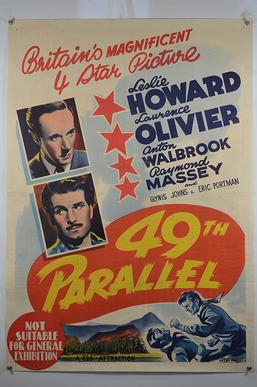
49th Parallel is a 1941 British war drama film, the third made by the team of Michael Powell and Emeric Pressburger. It was released in the United States as The Invaders.

The military history of Greece during World War II began on 28 October 1940, when the Italian Army invaded Greece from Albania, beginning the Greco-Italian War. The Greek Army temporarily halted the invasion and pushed the Italians back into Albania. The Greek successes forced Nazi Germany to intervene. The Germans invaded Greece and Yugoslavia on 6 April 1941, and overran both countries within a month, despite British aid to Greece in the form of an expeditionary corps. The conquest of Greece was completed in May with the capture of Crete from the air, although the Fallschirmjäger suffered such extensive casualties in this operation that the Oberkommando der Wehrmacht abandoned large-scale airborne operations for the remainder of the war. The German diversion of resources in the Balkans is also considered by some historians to have delayed the launch of the invasion of the Soviet Union by a critical month, which proved disastrous when the German Army failed to take Moscow.

The Allies, formally referred to as the United Nations from 1942, were an international military coalition formed during World War II (1939–1945) to oppose the Axis powers. Its principal members by the end of 1941 were the "Big Four" – the United Kingdom, United States, Soviet Union, and China.

Brest Fortress, formerly known as Brest-Litoŭsk Fortress, is a 19th-century fortress in Brest, Belarus. In 1965, the title Hero Fortress was given to the fortress to commemorate the defence of the frontier stronghold during the first week of Operation Barbarossa, when Axis forces invaded the Soviet Union on 22 June 1941. The title "Hero Fortress" corresponds to the title "Hero City" that the Presidium of the Supreme Soviet of the Soviet Union awarded to twelve Soviet cities.

Nazism made extensive use of the cinema throughout its history. Though it was a relatively new technology, the Nazi Party established a film department soon after it rose to power in Germany. Both Adolf Hitler and his propaganda minister Joseph Goebbels used the many Nazi films to promote the party ideology and show their influence in the burgeoning art form, which was an object of personal fascination for Hitler. The Nazis valued film as a propaganda instrument of enormous power, courting the masses by means of slogans that were aimed directly at the instincts and emotions of the people. The Department of Film also used the economic power of German moviegoers to influence the international film market. This resulted in almost all Hollywood producers censoring films critical of Nazism during the 1930s, as well as showing news shorts produced by the Nazis in American theaters.
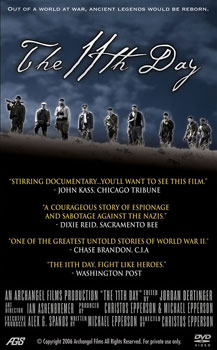
The 11th Day: Crete 1941 is a 2005 documentary film featuring eyewitness accounts from survivors of the Battle of Crete during World War II. The film was created by producer-director Christos Epperson and writer-producer Michael Epperson, and funded by Alex Spanos. Among the eyewitnesses interviewed are British SOE operative and famous travel writer Patrick Leigh Fermor, along with George Doundoulakis, and Cretan Resistance hero George Tzitzikas. The film also includes historical commentary and analysis by Chase Brandon of the CIA and Professor Andre Gerolymatos of Simon Fraser University.
Ships with Wings is a 1941 British war film directed by Sergei Nolbandov and starring John Clements, Leslie Banks and Jane Baxter. The film is set during the Battle of Greece (1940-1941). It depicts military aviation.

Carsta Löck was a German film actress.
Richard Brody is an American film critic who has written for The New Yorker since 1999.